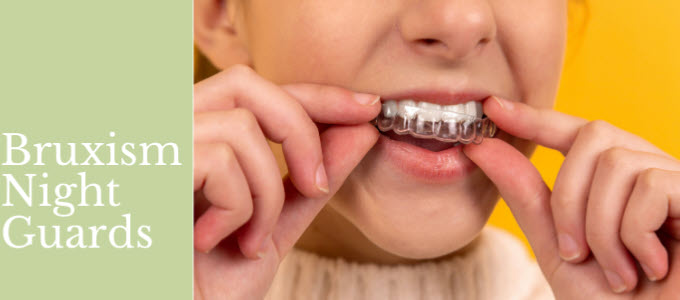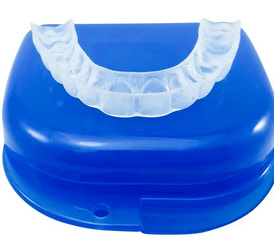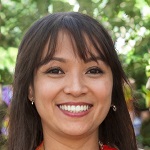Table of Contents

For the lucky ones, sleep is a calm and serene night ritual that leads to restful and fresh mornings. However, not everyone is lucky to have a night of quality sleep. Many of us, instead of waking up feeling good and revitalized, experience sensitive jaw muscles and/or teeth, have headaches or feel tenderness in our face. Unfortunately, these symptoms are a result of teeth grinding, also known as bruxism. If allowed to continue, it can seriously affect your dental health (1).
However, don’t worry. You can use a night guard to overcome this bruxism habit. Want to know more? Read in full this article.
What is a night guard?
Occlusal guards, also known as night guards, are specialized orthopedic devices used as a barrier to reduce pressure between the two dental arches. In addition, this device can also reduce the pain by grinding teeth and protect the gums, lips, and tongue from trauma.
The benefit of using a nightguard is that it also reduces stress on the jaw joint so that it does not suffer injury. In its use, the night guard must be under the supervision of a doctor so that its effectiveness can be monitored.
Note that tooth decay that arises from sleep bruxism is quite dangerous. This is because the tooth can be damaged in which the tooth’s surface becomes worn due to erosion. As a result, the risk of opening up the pulp chamber increases. If this habit is not stopped immediately, it can cause pain in the neck, face, ears, and head. You may also have difficulty opening or closing your jaw. To treat bruxism, a thorough dental and oral examination are required first.
How do you know you need to wear a night guard?
Bruxism generally occurs unconsciously while a person is sleeping. So, how do you know that you are a strong candidate for wearing a night guard? Various warning signs may indicate this. Here are some of the symptoms you need to look out for:
· Waking up with mild or significant tooth pain
· Having consistent headaches in the morning
· Experience aching or tender jaw pain and pain in the face
· Feeling like you haven’t slept through the night.
Note that having these symptoms doesn’t mean that you should start wearing a nightguard. If you experience one or more of these symptoms, consult your doctor to determine if it is worth wearing some type of nightguard to ease the discomfort of grinding your teeth.
How does a night guard work?
The night guard acts as a protective barrier between the two dental arches and allows the wearer not to grind or clench their teeth during the night. Thanks to the night guard, it is possible:
a. Maintain the correct space and distance between the dental arches inside the mouth
b. Protect the enamel from the trauma caused by rubbing. In fact, continuous nighttime rubbing can cause abrasion of tooth enamel and inflammation of the gums
c. Discharge the force exerted by the muscles rather than on the teeth, thus relaxing the mandibular and cervical muscles. This function is particularly important, as the contraction of the jaw muscles can cause pain in the shoulders, back, and trigeminal nerve.

Types of night guard
Grinding and clenching of teeth often occur overnight. Therefore, most night guards are for night use only. However, doctors will occasionally have their patients wear the guard during the day to minimize tooth damage.
Depending on the methods of creation and the materials used for it, it is possible to distinguish three different nightguard types.
1. Custom impression
Personalized or rigid bites are those custom-built by the dentist after having diagnosed the problem to be solved and having taken the dental impression. Despite being the most expensive, they are the most recommended as they are built based on your teeth’ characteristics and disturbances. In addition, it also helps in the correction of bad habits such as parafunction.
A specialist needs to identify the true cause of the problem that leads to the use of the bite, since some disorders can be caused by a mismatch of the teeth, which can only be solved with orthodontic intervention. An important thing to take into consideration is that this type of nightguard is more durable over time.
2. Self-modelling
This category includes thermoplastic resin or silicone masks that adapt to your dental impression. They are readily available at pharmacies. A self-modeling bite is indicated in the treatment of purely muscle-tensile pathologies and has the main function of deprogramming the chewing muscles. To use them, you need to bite down to create a customized impression.
3. Preforms
These types of night guards are resin plates with a standard conformation. However, using them can give rise to occlusal, posture, and muscular problems and can lead to a displacement of the teeth. In any case, it is essential to undergo a specialist visit to be treated and learn which bite to use. Never make choices based on a self-diagnosis.
What to expect when wearing a night guard
The use of any night guard is effective in helping to stop the grinding of teeth. However, don’t expect to feel comfortable with it right away. Most people who have used night guards admitted that it could take weeks or even months to start feeling natural when sleeping with it. Once you are used to sleeping with a night guard, you can hardly sleep without it.
Lastly, remember that like any other orthodontic device, the night guards need careful and daily cleaning to last longer and avoid germs deposits.
Conclusion
Teeth grinding is not just an isolated dental problem. Considering the many stresses and the demands of life today, there are millions of people around the world suffering from night teeth grinding. Fortunately, these people can take advantage of night guards and wake up feeling ready to face the day. If you can have a night of adequate sleep and wake up without pain and headaches, you are more likely to be productive during the day


